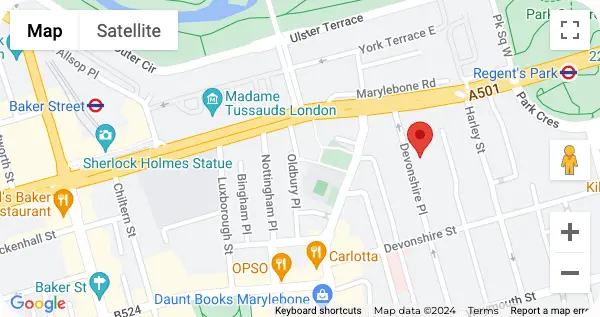Dermatological
Non-surgical
Surgical
Body Concerns
Health & Wellness
Skin & Face
Expert care for a wide range of skin conditions, ensuring healthy, radiant skin.
Lesions & Bumps
Comprehensive care for skin lesions and bumps, promoting clear and healthy skin.
Lifting & Tightening
Advanced treatments to lift and lighten the skin, enhancing firmness and brightness.
Rejuvenation
Revitalize your skin with advanced treatments designed to restore a youthful glow.
Skin Treatments
Effective solutions for a variety of skin concerns, promoting clear and healthy skin.
Wellness
Holistic skincare approaches to support overall skin health and well-being.
Advanced, non-invasive treatments to rejuvenate your appearance without surgery.
Body Treatments
Transformative, non-invasive treatments to sculpt and tone your body effortlessly.
Facial Treatments
Rejuvenating facial treatments to refresh and enhance your natural radiance.
Hair Treatments
Advanced treatments to restore hair vitality and promote healthy growth.
Injectables
Minimally invasive injectables to smooth wrinkles and enhance facial contours.
Precision cosmetic surgery tailored to enhance and refine your natural beauty.
Body Surgery
Expertly performed body surgeries to reshape, contour, and enhance your physique.
Breast Surgery
Specialized breast surgeries to enhance shape, size, and symmetry for a natural look.
Cosmetic Andrology
Advanced procedures designed to enhance male aesthetics and address intimate concerns.
Cosmetic Gynaecology
Tailored surgical solutions to enhance feminine aesthetics and improve intimate well-being.
Facial Surgery
Precision facial surgeries to refine features and achieve natural, balanced results.
Fat Transfer/Removal
Advanced fat transfer and removal techniques to sculpt and enhance your body’s contours.
Comprehensive solutions to address a range of body concerns, from stubborn fat to skin laxity.
Breasts
Tailored solutions for breast concerns, including size, shape, and symmetry.
Other Areas
Targeted solutions for stubborn areas of the body, tailored to your unique needs.
Volume & Contouring
Specialized treatments to enhance body volume and improve overall contour for a balanced silhouette.
Holistic care focused on improving overall health and well-being for a balanced lifestyle.
Digestive Health
Comprehensive care to support digestive health and improve overall well-being.
Energy & Immunity
Holistic approaches to boost energy levels and strengthen your immune system for optimal health.
General Health
Personalized strategies to maintain and enhance your overall health and vitality.
Expert care for a wide variety of skin and facial concerns, promoting a healthy, glowing complexion.
Ageing Signs
Expert treatments to minimize ageing signs, rejuvenating your skin for a youthful glow.
Skin Texture & Tone
Advanced treatments to improve skin texture and even out tone for a smoother, radiant complexion.
Specific Areas
Targeted treatments to address skin concerns in specific facial areas for balanced, refined results.
Volume & Contouring
Tailored solutions to restore facial volume and enhance natural contours for a more youthful appearance.
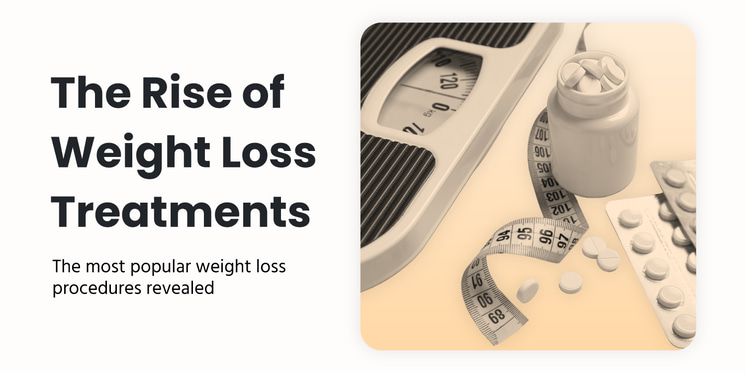
The global market for obesity drugs is projected to skyrocket to £80 billion by 2030, a dramatic increase from £3 billion in 2023. With this surge in demand, weight loss treatments are becoming more prevalent, with both surgical and non-surgical options gaining traction. As the landscape of weight loss procedures evolves, it’s essential to understand which treatments are rising in popularity and how to navigate this growing market safely.
This report will explore the most sought-after weight loss treatments, drawing on Harley Street Skin Clinic insights to highlight the top surgical and non-surgical procedures. With a focus on safety, we’ll answer the most common weight loss questions while emphasising the importance of choosing regulated professionals for these procedures.
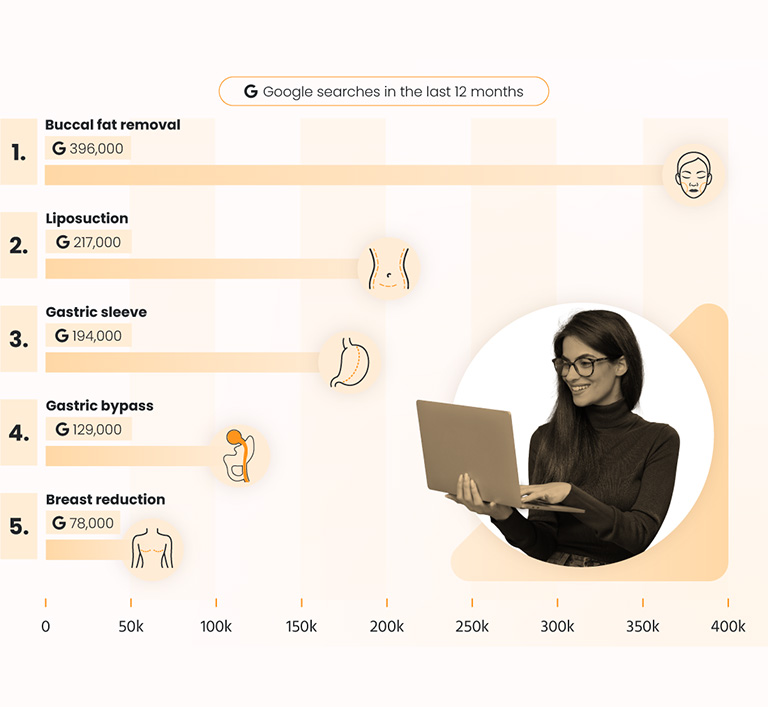
Buccal fat removal is a cosmetic surgery designed to slim the face by removing fat pads from the cheeks, creating a more sculpted and contoured look. This procedure is minimally invasive and typically performed under local anaesthesia. While it enhances facial aesthetics, it does not contribute to overall weight loss and is best suited for individuals with naturally fuller cheeks. Results are permanent, and excessive fat removal can lead to a gaunt appearance as a person ages.
Liposuction is a body contouring procedure that removes stubborn fat deposits from areas such as the abdomen, thighs, hips, and arms. Unlike weight loss surgeries, liposuction is not intended for obesity management but rather for reshaping specific body parts that do not respond to diet and exercise. The procedure involves inserting a thin tube (cannula) to suction out fat, and recovery can take several weeks, with swelling and bruising common side effects. While results can be long-lasting, maintaining a healthy lifestyle is essential to prevent fat accumulation in untreated areas.
The gastric sleeve, or sleeve gastrectomy, is a weight loss surgery that permanently reduces the size of the stomach by approximately 80%, limiting food intake and promoting early satiety. This procedure is often recommended for individuals who struggle with traditional weight loss methods. In addition to significant weight loss, patients often experience improvements in conditions such as diabetes and hypertension. Recovery requires dietary adjustments, including a gradual transition from liquids to solid foods, and long-term success depends on adherence to a healthy lifestyle.
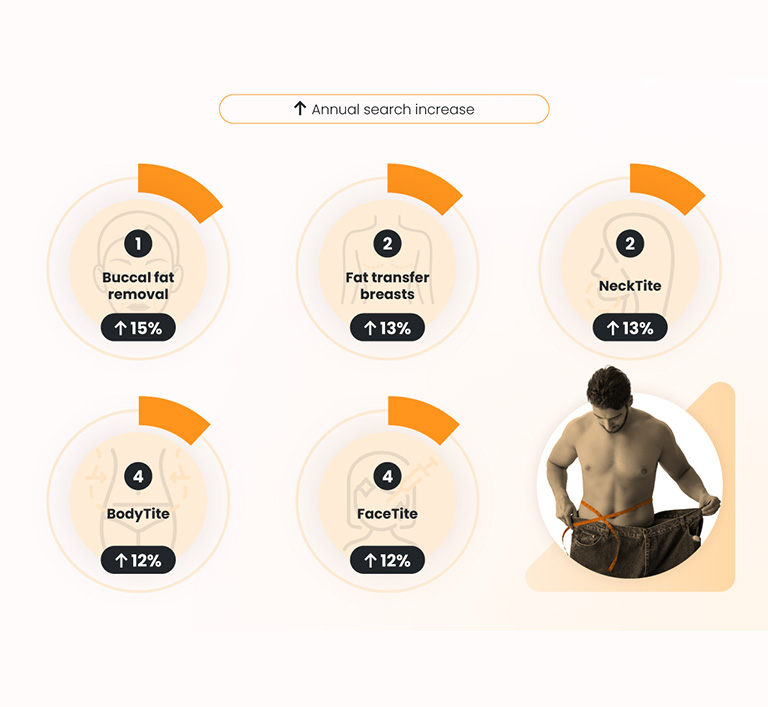
Buccal fat removal has seen a 15% increase in searches in the last 12 months, likely fueled by social media trends such as ‘mewing’ and celebrity-led trends. The procedure is particularly popular among younger individuals with rounder faces who want a more defined jawline and cheekbones without relying on weight loss or contouring makeup.
Fat transfer to the breasts, which has seen a 13% year-on-year rise in searches, is an alternative to traditional breast implants that use a patient’s own fat to enhance breast volume and shape. The procedure involves liposuction to remove fat from areas like the abdomen or thighs, which is then purified and injected into the breasts. Unlike implants, fat transfer provides a more natural look, with fewer risks of complications such as implant rupture. However, not all of the transferred fat survives, meaning multiple sessions may be needed to achieve the desired results.
NeckTite, which also experienced a 13% increase in searches last year, is a minimally invasive procedure that tightens sagging skin and reduces fat on the neck and jawline using radiofrequency-assisted lipolysis (RFAL). Often considered a less aggressive alternative to a surgical neck lift, NeckTite melts fat and stimulates collagen production, resulting in a firmer, more youthful-looking neck. While results are long-lasting, maintaining a stable weight and good skincare habits can help prolong the effects.

Semaglutide is the most searched weight loss medication, with over 16 million searches last year, having gained widespread attention due to its effectiveness in promoting significant weight loss. Originally developed to treat type 2 diabetes, this GLP-1 receptor agonist works by reducing appetite, slowing digestion, and helping regulate blood sugar levels. Marketed under brand names like Wegovy and Ozempic, semaglutide has been embraced by those struggling with obesity or weight-related health issues. However, it requires ongoing use to maintain results, and common side effects include nausea, vomiting, and gastrointestinal discomfort.
With over 10 million searches in the last 12 months, tirzepatide is another highly sought-after weight loss medication that has shown promising results. Sold under the brand name Mounjaro, it is a dual GIP and GLP-1 receptor agonist, meaning it targets two key hormone pathways to enhance insulin sensitivity, suppress appetite, and promote weight loss. It was also originally approved for type 2 diabetes, and its potential for weight management has made it a competitor to semaglutide. Studies suggest that tirzepatide may lead to even greater weight loss than semaglutide, but side effects such as nausea, diarrhoea, and fatigue remain concerns.
With over 8 million searches annually, Orlistat is a long-established weight loss medication that prevents dietary fat absorption in the digestive tract. Unlike semaglutide and tirzepatide, orlistat does not affect appetite but instead blocks enzymes that break down fat, leading to reduced calorie intake. Available by prescription (Xenical) and over-the-counter (Alli), it is often used with a low-fat diet. While effective, orlistat can cause unpleasant gastrointestinal side effects, including oily stools and increased bowel movements, making dietary adjustments essential for tolerability.
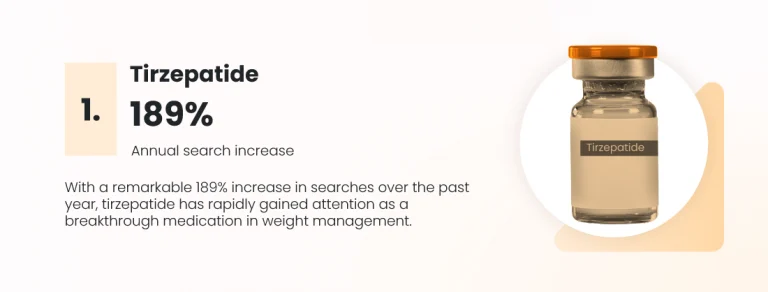
With a remarkable 189% increase in searches over the past year, tirzepatide has rapidly gained attention as a breakthrough medication in weight management. Its growing popularity is largely driven by impressive clinical trial results, which have shown it can lead to unprecedented levels of weight loss for a medication. The surge in interest is also fueled by its recent FDA approval specifically for weight loss, making it a highly anticipated option for those seeking medical intervention for obesity.
Seeing a 57% year-on-year increase in searches, the combination of phentermine and topiramate (sold under the brand name Qsymia) is a well-established weight-loss prescription medication. Phentermine is a stimulant that suppresses appetite, while topiramate, an anticonvulsant, helps with satiety and reduces cravings. This dual-action approach makes it an effective option for those struggling with obesity. However, it is not without risks—side effects include dry mouth, dizziness, insomnia, and a potential increase in heart rate, making it unsuitable for individuals with certain cardiovascular conditions.
With a 38% surge in searches last year, the combination of naltrexone and bupropion (marketed as Contrave) takes third place among weight loss medications growing in popularity. Naltrexone, commonly used for addiction treatment, and bupropion, an antidepressant, work together to influence brain pathways that regulate hunger and cravings. While it has shown effectiveness in supporting weight loss when combined with lifestyle changes, potential side effects include nausea, headaches, and an increased risk of mood-related side effects.
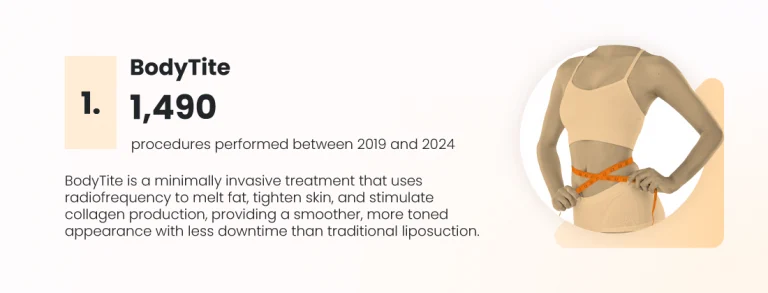
From 2019 to 2024, BodyTite was the most performed weight loss-related procedure at the Harley Street Skin Clinic, with 1,490 procedures carried out. This minimally invasive body contouring treatment uses radiofrequency-assisted lipolysis (RFAL) to melt fat while tightening the skin, making it a popular choice for those looking to refine their figure without undergoing traditional liposuction. By promoting collagen production, BodyTite reduces stubborn fat deposits and enhances skin elasticity, offering a smoother, more toned appearance with less downtime than surgical alternatives.
In second place is FaceTite, a procedure that was performed 909 times. It is a non-surgical alternative to a facelift that targets sagging skin and excess fat on the face and neck. Using the same RFAL technology as BodyTite and NeckTite, FaceTite provides skin-tightening benefits while reducing fat, making it an appealing choice for those seeking a more youthful, sculpted appearance without the need for invasive surgery. Its ability to improve skin laxity while requiring minimal recovery time has contributed to its growing popularity, particularly among patients looking for subtle yet effective facial contouring.
With 342 procedures performed, fat transfer has become an increasingly sought-after treatment for natural body contouring and enhancement. This procedure involves removing excess fat from one area of the body, such as the abdomen or thighs, via liposuction and reinjecting it into another area, commonly the breasts, buttocks, or face. Unlike synthetic fillers or implants, fat transfer provides long-lasting, natural-looking results with a lower risk of rejection or complications.
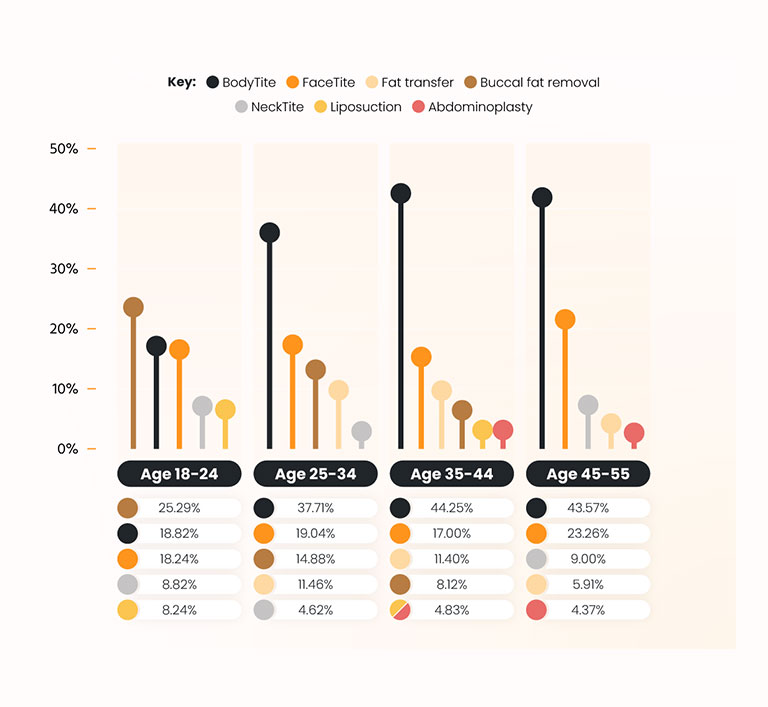
When it comes to weight loss procedures, different age groups are getting the most; more than a quarter (25.29%) of Harley Street Skin Clinic patients in the 18 to 24 group had buccal fat removal. While more modern treatments such as BodyTite and FaceTite were more popular in this age group, liposuction, a more traditional weight loss procedure, was only performed on less than 1 in 10 (8.24%).
BodyTite was by far the most popular procedure among the three remaining age groups, with at least 37.71% of the total proportion of each age group having had the treatment. It was most popular with Harley Street Skin Clinic patients in the 35 to 44 age group, with just under half (44.25%) having received the procedure.
More invasive procedures like abdominoplasty and liposuction (4.83% each) became increasingly popular among Harley Street Skin Clinic patients in the 35 to 55 age range, suggesting that older individuals are more willing to undergo surgical interventions for long-term results. Facial contouring procedures (buccal fat removal, FaceTite, and NeckTite) were more popular among younger Harley Street Skin Clinic patients, perhaps aligning with the ‘mewing’ trend.

Again, the main standout among different genders receiving weight loss treatments is the domination of BodyTite, with more than a third (37.12% and 39.01%) of male and female Harley Street Skin Clinic patients getting the procedure.
Liposuction remains on the lower side of the spectrum, being slightly more preferred by male Harley Street Skin Clinic patients (4.41%) than female patients (3.95%), with more modern treatments remaining the preference. Male patients seemed to have a higher proportion that preferred Ozempic compared to women, with 2.2% of men receiving treatment at Harley Street Skin Clinic getting the medication between 2019 and 2024.
Below, Dr. Aamer Khan, Medical Doctor and Co-Founder of the Harley Street Skin Clinic, answers some of the most common questions about weight loss procedures, along with some best practices and guidance.
The amount of weight loss after gastric sleeve surgery can vary from person to person, but most people lose about 50 to 70% of their excess weight within the first 18 to 24 months. This can be anywhere from 50 to 100 pounds or more, depending on your starting weight, commitment to a healthy diet and exercise plan. Weight loss may slow down after the initial phase, and long-term success depends on lifestyle changes and maintaining a balanced diet.
The minimum weight requirement for gastric bypass surgery can vary depending on the surgeon and country. In general, the BMI (Body Mass Index) is the primary factor for gastric bypass. A BMI of 40 or higher (obesity level) is often a requirement for surgery. Alternatively, if your BMI is 35 to 39.9 and you have obesity-related health conditions (like diabetes or high blood pressure), you may also be a candidate. It’s always best to consult with a bariatric surgeon who can evaluate your individual health and situation.
A major consideration for many is recovery time so that you can properly inform your employer how long you may be unable to come into work. The recovery time after gastric bypass surgery typically ranges from two to six weeks. Many people return to work after about two weeks if their job is not physically demanding, as long as there are no complications. However, if your work involves physical labour, it may be closer to four to six weeks before you’re cleared to return. As always, following your doctor’s advice on when to resume work, exercise, and other activities is paramount.
Keeping weight off after gastric bypass surgery involves long-term lifestyle changes, such as following a healthy diet. A balanced, nutrient-rich diet is crucial for maintaining weight loss. Eating smaller, frequent meals and avoiding high-calorie, high-fat, and sugary foods is a good practice.
Regular exercise can also help, you should aim for at least 30 minutes of moderate activity most days of the week if you’re generally fit. Physical activity helps maintain weight loss, improve metabolism, and enhance overall well-being. It’s also important to be mindful of any behavioural changes, keep track of your eating habits, practice mindful eating, and avoid emotional eating. Joining support groups or working with a nutritionist or therapist can help maintain motivation. Additionally, regular follow-up appointments with your surgeon or healthcare provider are important to monitor your health and progress.
We created a seed list of medical procedures and medications typically used for weight loss, using the National Institute of Diabetes and Digestive and Kidney Diseases, Obesity Medicine Associationand internal data from Harley Street Skin Clinic.
We then used Google Keyword Plannerto record the global search volume for these weight loss medicines over the last 12 months and the 12 months before that to calculate the percentage increase in search volume. This allowed us to show which medications are the most searched for and those growing in popularity. For the medical procedures, we used Ahrefsto get the global search volume and 12-month search increase, as Google Keyword Planner seemed to limit the data.
We then used Harley Street Skin Clinic’sinternal data on weight loss treatments performed on clients from 2019 to 2024, which was also broken down by age and gender. This allowed us further insights into which procedures and medications people are most commonly receiving.
Lastly, we collated a list of common weight loss procedure questions using the NHSand Intermountain Health. We then ran these questions through Google Keyword Planner to get the number of searches globally in the last 12 months.
59,645
Happy patients served.
Need to reach us?
Contact or visit our clinic.
We're based in central London at the historic 14 Devonshire Pl which is only a short 2 minute walk from Regents Park tube station a 10 minute taxi journey to Kings Cross, and St Pancras stations.
We're open Monday - Friday 8am - 8pm, and Saturdays 9am - 5pm, feel free to drop in to talk to a member of our team where they can answer any of your questions.
Alternatively book a free consultation, request a callback, or call us on 0207 4364441.
